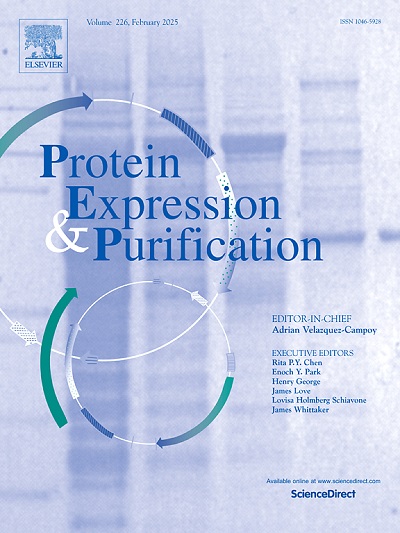Enhanced performance of Thermococcus kodakarensis KOD1 polymerase in PCR via fusion to Sulfolobus tokodaii Sto7d
IF 1.2
4区 生物学
Q4 BIOCHEMICAL RESEARCH METHODS
引用次数: 0
Abstract
The DNA polymerase from Thermococcus kodakarensis KOD1 (KOD) is widely utilized in polymerase chain reaction (PCR) due to its high processivity and fidelity. However, like many other B-family DNA polymerases, it faces limitations in extension efficiency, amplicon length, and resistance to PCR inhibitors. In order to further enhance its capability, novel mutants were engineered by fusing a 7 kDa nonspecific double-stranded DNA (dsDNA)-binding protein from Sulfolobus tokodaii (Sto7d) to the C-terminus of KOD via distinct peptide linkers, resulting in a set of KOD-Sto7d polymerase variants. These constructs were expressed, purified, and characterized. Among the variants, KOD-GT4G-Sto7d exhibited the best PCR performance and was selected as the representative variant for subsequent assays. Compared with wild-type KOD (KOD-WT), KOD-Sto7d demonstrated significantly improved extension efficiency that successfully amplified 7 kb targets with only 10 s elongation time, increased salt tolerance up to 120 mM NaCl for 2 kb targets, and an improved capacity to amplify long DNA fragments up to 10 kb within 4 min. In comparison with a commercially available KOD mutant fused to a dsDNA-binding protein (Sso7d from Saccharolobus solfataricus) at its C-terminus (KOD-Sso7d), KOD-Sto7d demonstrated greater salt tolerance and sensitivity. These results suggest that KOD-Sto7d is a robust polymerase suitable for time-saving and high-demanding PCR.
通过融合tokodaisulfolobus Sto7d提高柯达热球菌KOD1聚合酶的PCR性能
kodakarensis热球菌(Thermococcus KOD1, KOD)的DNA聚合酶因其高精密度和保真度被广泛应用于聚合酶链反应(polymerase chain reaction, PCR)中。然而,像许多其他b家族DNA聚合酶一样,它在延伸效率、扩增子长度和对PCR抑制剂的抗性方面存在局限性。为了进一步增强其能力,我们将tokodaii Sulfolobus (Sto7d)中一个7 kDa的非特异性双链DNA (dsDNA)结合蛋白通过不同的肽连接体融合到KOD的c端,从而构建了一组KOD-Sto7d聚合酶变体。这些结构被表达、纯化和表征。其中,KOD-GT4G-Sto7d表现出最好的PCR性能,并被选为后续检测的代表性变异。与野生型KOD (KOD- wt)相比,KOD- sto7d扩增效率显著提高,在10 s的延伸时间内扩增出7 kb的目标,对2 kb目标的耐盐性提高到120 mM NaCl,在4 min内扩增10 kb长的DNA片段的能力也有所提高。与市售的在其c端融合dsdna结合蛋白(来自Saccharolobus solfataricus的Sso7d)的KOD突变体(KOD-Sso7d)相比,KOD- sto7d表现出更强的耐盐性和敏感性。这些结果表明KOD-Sto7d是一种强大的聚合酶,适合于节省时间和高要求的PCR。
本文章由计算机程序翻译,如有差异,请以英文原文为准。
求助全文
约1分钟内获得全文
求助全文
来源期刊

Protein expression and purification
生物-生化研究方法
CiteScore
3.70
自引率
6.20%
发文量
120
审稿时长
32 days
期刊介绍:
Protein Expression and Purification is an international journal providing a forum for the dissemination of new information on protein expression, extraction, purification, characterization, and/or applications using conventional biochemical and/or modern molecular biological approaches and methods, which are of broad interest to the field. The journal does not typically publish repetitive examples of protein expression and purification involving standard, well-established, methods. However, exceptions might include studies on important and/or difficult to express and/or purify proteins and/or studies that include extensive protein characterization, which provide new, previously unpublished information.
 求助内容:
求助内容: 应助结果提醒方式:
应助结果提醒方式:


